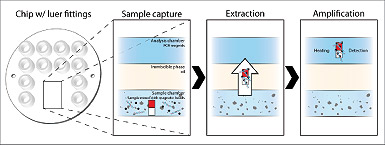
Background
The philosophy of Point-of-Care (PoC) testing is to take the medical tests usually done by central laboratories and move them near the site of patient care (e.g. hospital bed or general practitioners office), thus allowing for the medical doctor to quickly decide which therapy to choose. There are a number of ways to do this, but a general tendency is to have a bench top machine with single-use disposable chips that are able to carry out a certain analysis. It is important that the machine is easy to use (sample-in-answer-out) and has a rapid analysis time. A central issue with the PoC systems commercially available today is a high chip cost which is undesirable. The reason for the high cost is the complexity of the chips, both in regard to materials used and the on-chip features.
The PolyNano project aims for the development and application of mass-producible injection moulded polymer lab-on-a-chip systems. The advantage of this approach is the very low cost of individual chips, provided chip designs are kept simple.
Objective
This project aims to demonstrate a full lab-on-chip system capable of performing PoC diagnostics, complete with integrated fluid handling, sample preparation and Polymerase Chain Reaction (PCR) analysis. The biological case chosen is Respiratory Syncytial Virus, which each year causes respiratory tract infections in many infants and children. In some cases the patients will develop bronchiolitis and require hospitalisation. This project collaborates with the Centre for Integrated Point of Care at DELTA and the Danish State Serum Institute.
The goal is to develop and apply immiscible phase filtration technology in combination with solid phase extraction (using magnetic beads) for the on-chip extraction of nucleic acids. Analysis and detection is to be done on-chip by polymerase chain reaction (the design concept can be seen in Figure 1). To keep the chip simple it will rely completely on passive filling mechanisms and an external magnet to transport nucleic acids. This means that the chip itself will be made entirely of polymer and may contain pre-loaded reagents.